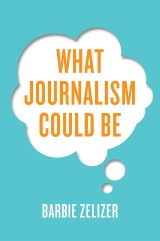Details

What Journalism Could Be
1. Aufl.
|
18,99 € |
|
| Verlag: | Wiley |
| Format: | |
| Veröffentl.: | 23.05.2017 |
| ISBN/EAN: | 9781509507887 |
| Sprache: | englisch |
| Anzahl Seiten: | 256 |
DRM-geschütztes eBook, Sie benötigen z.B. Adobe Digital Editions und eine Adobe ID zum Lesen.
Beschreibungen
<p><i>What Journalism Could Be</i> asks readers to reimagine the news by embracing a conceptual prism long championed by one of journalism�s leading contemporary scholars. A former reporter, media critic and academic, Barbie Zelizer charts a singular journey through journalism�s complicated contours, prompting readers to rethink both how the news works and why it matters. <br /><br /> Zelizer tackles longstanding givens in journalism�s practice and study, offering alternative cues for assessing its contemporary environment. Highlighting journalism�s intersection with interpretation, culture, emotion, contingency, collective memory, crisis and visuality, Zelizer brings new meaning to its engagement with events like the global refugee crisis, rise of Islamic State, ascent of digital media and twenty-first-century combat.<br /><br /> Imagining what journalism could be involves stretching beyond the already-known. Zelizer enumerates journalism�s considerable current challenges while suggesting bold and creative ways of engaging with them. This book powerfully demonstrates how and why journalism remains of paramount importance. </p>
Contents<br />1: Imagining Journalism<br />Beginnings<br />2: Definitions of Journalism<br />Intro Section 1: Cues for Considering Key Tensions in Journalism<br />Barbie Zelizer, Jennifer Henrichsen and Natacha Yazbeck<br />3: On “Having Been There”: “Eyewitnessing” as a Journalistic Key Word<br />4: On the Shelf Life of Democracy in Journalism Scholarship<br />5: When Practice is Undercut By Ethics<br />Intro Section 2: Cues for Considering Disciplinary Matters<br />Barbie Zelizer, Jennifer Henrichsen and Natacha Yazbeck<br />6: Journalism and the Academy<br />7: Journalism in the Service of Communication<br />8: When Facts, Truth, and Reality Are God-Terms: On Journalism’s Uneasy Place in Cultural Studies<br />Intro Section 3: Cues for Considering New Ways of Thinking About Journalistic Practice<br />Barbie Zelizer, Jennifer Henrichsen and Natacha Yazbeck<br />9: Journalists as Interpretive Communities<br />10: The Culture of Journalism<br />11: When War and Conflict Are Reduced to a Photograph<br />Endings:<br />12: Thinking Temporally About Journalism’s Future<br />References
“No one knows the journalism studies literature better than Zelizer. This book demonstrates as much. Its chapters show Zelizer masterfully putting the literature to use, rendering its main points, interrogating its blind spots, pushing the field forward.”<br /><b> David Ryfe, University of Iowa</b><br /><br /> “With her customary rigour and independent zeal, Zelizer has reimagined not just journalism in its moment of crisis and change, but also journalism studies. Her focus on journalism as it is, rather than what we might wish it to be, allows her to imagine realistic ways that the 'traditional' ideas and practice of journalism can now offer the possibilities of creative alternatives to the usual narrative of 'Old' and 'New' news media. Through a close attention to key case studies and a thorough critical analysis of current academic approaches, she makes a compelling case for her key insight: both journalists and journalism scholars must think much more creatively about the vital role of journalism in the context of our challenging local and global public spheres.”<br /><b> Charlie Beckett, London School of Economics and Political Science<br /></b> <p>"This book is so refreshing because it uplifts the spirit of the discussion of journalism, and [Zelizer] never picks a side on any of the issues. Just like a great moderator, she peacefully addresses all the problems from a place of truth."<br /><i><b>Communication Booknotes Quarterly</b></i></p>
A former journalist, <b>Barbie Zelizer</b> is the Raymond Williams Professor of Communication, and the Director of the Scholars Program in Culture and Communication, at the Annenberg School for Communication at the University of Pennsylvania.


















